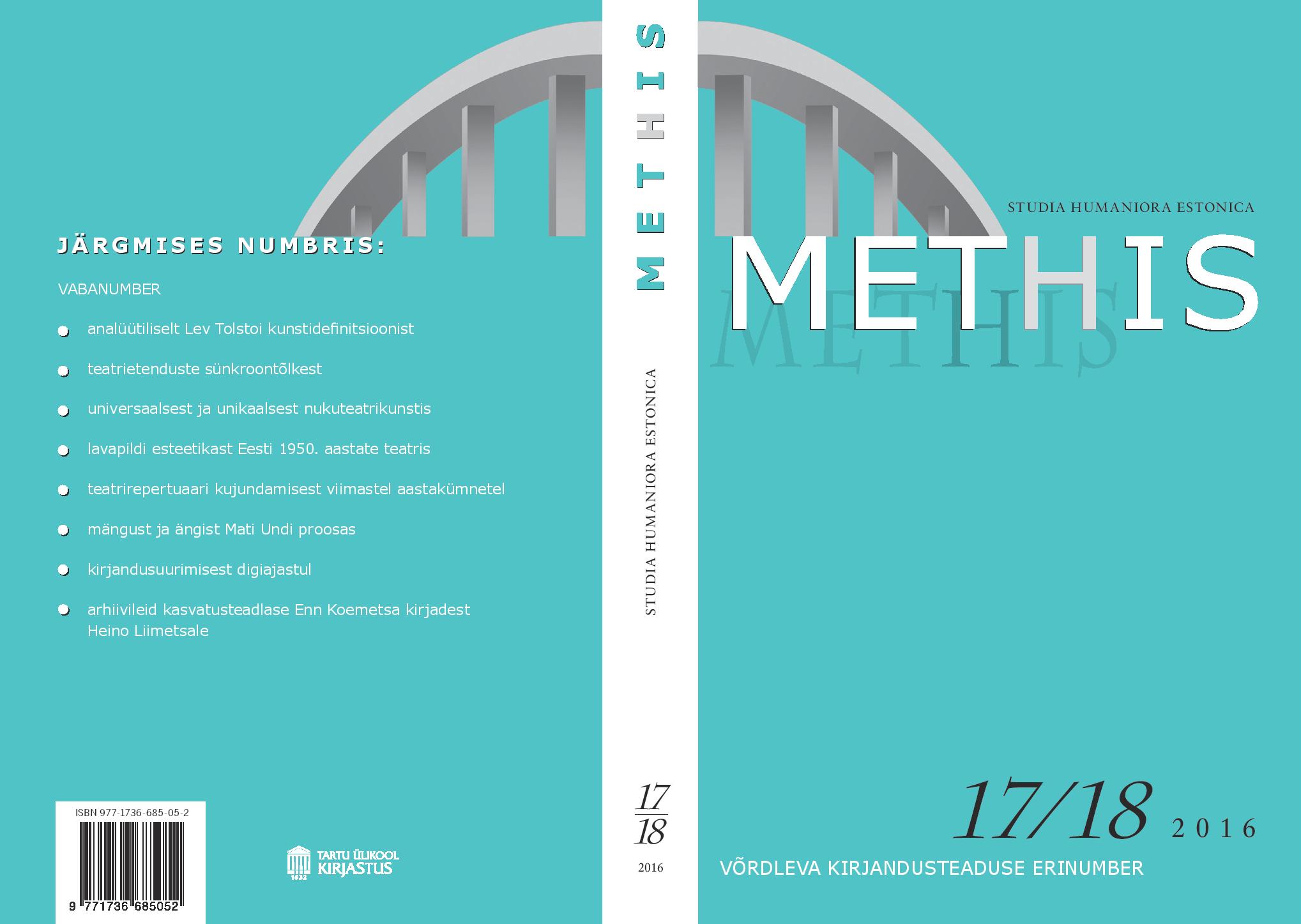Armastusest: tõerežiimid, kultuurilised kujutelmad ja kehaline ilmakogemus / On Love: Regimes of Truth, Cultural Imaginaries and the Bodily Experience of Being in the World
DOI:
https://doi.org/10.7592/methis.v14i17/18.13216Keywords:
armastus, tõerežiimid, kultuurilised kujutelmad, Alain Badiou, Silvia Rannamaa, Jane Austen, regimes of truth, cultural imaginaries, loveAbstract
Teesid: Artikkel lähtub teesist, et armastus kui tunne on lahutamatu sellest, kuidas seda tunnet sõnastatakse ja mõistetakse, ning analüüsib armastust kui kultuurilist kujutelma, mille äratundmine toimub vastavalt ühiskondlikele tõerežiimidele. Analüüsin armastusekujutust kirjandusteostes Alain Badiou armastusmudelite abil ning lisan juurde „omailma-armastuse mudeli“, mis rõhutab armastatu lahutamatust teda ümbritsevast ruumist: armastus ei hõlma vaid armastatut kui kindlalt piiritletud kehalist üksust, vaid ka seda, kuidas armastatu suhestub teda ümbritseva ruumiga ja inimestega.
This article presents and analyses Western cultural models for speaking and thinking about love. According to Michel Foucault, each society establishes its regimes of truth: certain types of discourses are approved as truthful while others are declared unreliable. Each society includes mechanisms of control, which distinguish true statements from false, and assign some people (but not others) the authority to judge the true and the false, the acceptable and the unacceptable. Regimes of truth also establish paradigms for judging the truthfulness of love: according to the romantic regime, for example, love is something ephemeral, ungraspable and immeasurable, it transgresses established boundaries and norms; according to the pragmatic regime, by contrast, love can be expressed in economic terms and thus measured: a precious gift expresses commitment (else it would be a waste of money). There may be no common ground for one regime to concede legitimacy to a value asserted by a competing regime. In the view of the romantic regime, for example, the pragmatic regime might be judged as cynical and failing to grasp the essence of love – such weighing of feelings belongs to modern regimes of truth. Both romantic and pragmatic regimes of truth belong to the larger field of cultural imaginaries. Regimes of truth order and systematize the sphere of cultural imaginaries. I understand cultural imaginaries as the common ground for cultural identifications, a cultural complex that links together cultural memory, the value systems of one’s present era, and commonly shared expectations of the future. Cultural imaginaries are grounded partly in national culture, including the cultural knowledge shared by the national community and communicated in classic texts of that culture. In addition to specifically national cultural knowledge, cultural imaginaries of course include supranational value systems. The sphere of cultural imaginaries includes many inconsistencies and incoherences and it is always in flux. Alain Badiou outlines four philosophical models of love: romantic, practical, sceptical, and existential. I suggest that only two of these, romantic and practical (which I call pragmatic), have attained the status of truth regimes. Badiou foregrounds the existential model: according to this model, love is the refashioning of the world through the two, the replacement of an egocentric perspective with a new perspective based on difference. The greatest enemy of such love is not an intruder from the outside, but the self itself that prefers its own egocentric world to the love-world that is constituted through difference. Following some popular models of romantic relations in novels, I point to frequent tensions between the different models of love in fiction: contract-love versus romantic love, love as desire versus love as a friendly attachment, and I promote a model of love as encompassing not simply the figure of the beloved, but also his or her surrounding world. The conglomerate of relations that surrounds the human body and plays part in its identification could be called, following Jacob von Uexküll, an environing world of love. Thus, in Pride and Prejudice by Jane Austen or in Kasuema by Silvia Rannamaa, the female protagonist loves her male counterpart within the context of his environing world, where the beloved’s situatedness in the world becomes a defining part of the amorous relationship. Novels and films offer also a model of love which runs against Badiou’s ideal model of existential love: in some texts, the reader witnesses the birth of agency through love. In Asta Willmann’s short story “Patu vili”, the main character Berit grows from a passive, suffering, violated woman into an active, powerful figure who has strength enough to make groundbreaking decisions. She does not experience love as an existential relationship that offers her the possibility to relate to the world through the two, but she does grow as a human being and she finds strength and support in her relationship. The article concludes with the analysis of Mäetaguse vanad by Anton Hansen Tammsaare – in face of the death of one of the longterm partners, this short story exemplifies important qualities of shared life.


